
Fake Fundraising and Embezzlement During the Artsakh War
During the Artsakh war in the fall of 2020, residents of Armenia and the Diaspora as well as foreigners donated money and other items to help those on the front lines, those affected by the war, and the displaced.
The big wave of aid was an opportunity for some groups engaged in fraudulent activity to organize fake fundraisers and misappropriate public funds.
The RA Police investigated cases of fraud committed using .org and .com domains but could not find the culprits. Cases have been filed against fundraisers organized on the social media network Facebook. Some have gone unpunished, while others are under preliminary investigation. The RA law enforcement bodies informed us that no person has been arrested for committing fraud.
The Hetq Media Factory Team attempted to fully investigate online and offline cases of money extorted fraudulently during the war.
In the post-war period, our research showed that the aid collected did not serve its purpose in all cases; successful and unsuccessful attempts at embezzlement and fraudulent fundraising were documented.
Fake websites resembling the Hayastan All Armenian Fund
During the war, RA state institutions, in particular the Ministry of Defense, called for money to be transferred to the Hayastan All Armenian Fund. From September 27th to October 20th, the word "foundation" was the number one Google search in Armenia.
Taking into account the Foundation’s reputation and reliability, fraudsters created fake websites with similarities to the Foundation’s domain name, and tried to embezzle money by confusing individual donors.
himnadramfund.org is among the best examples of this. The first alerts about the site being fake came from social media networks. After many complaints, it is now blocked.
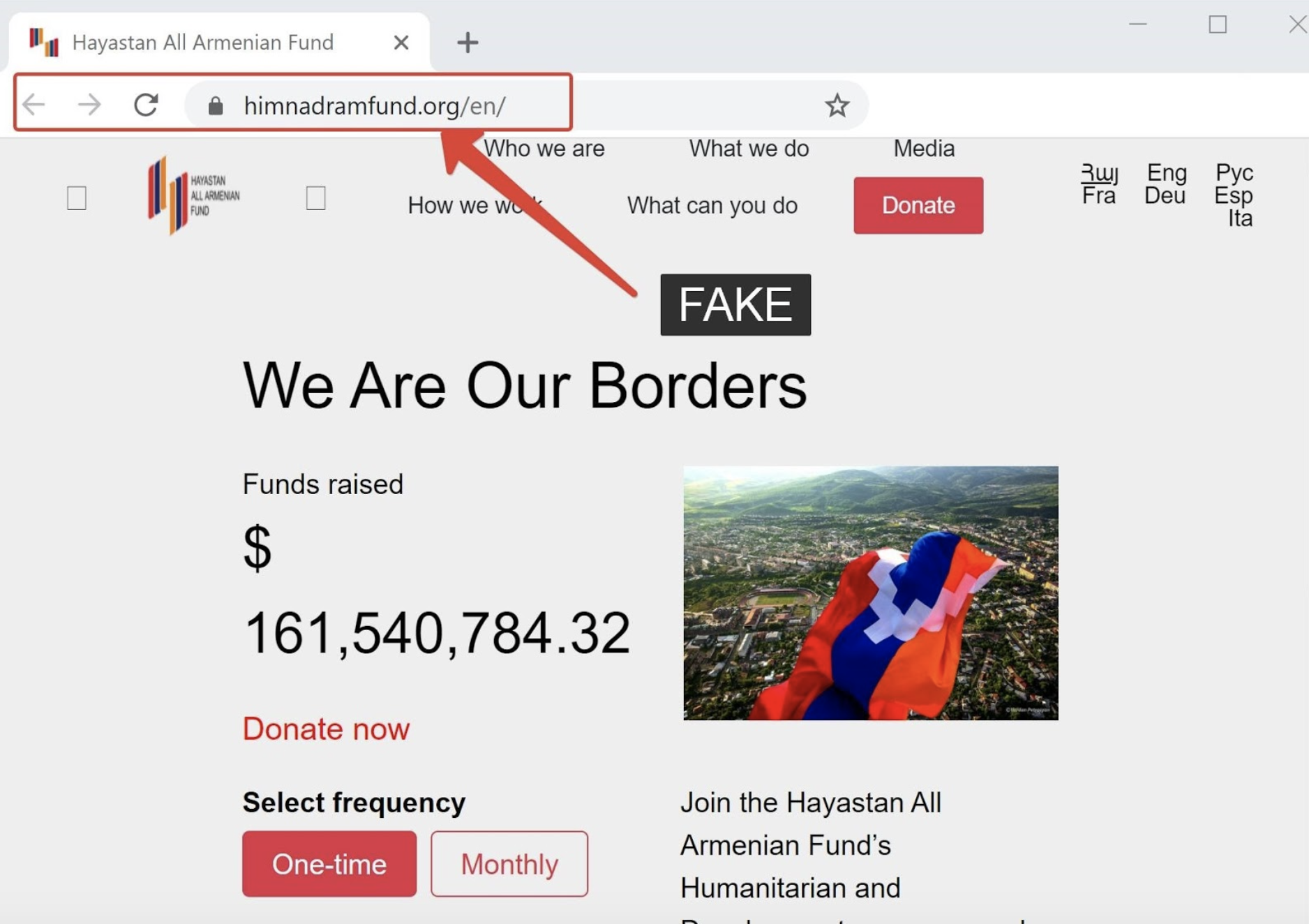 |
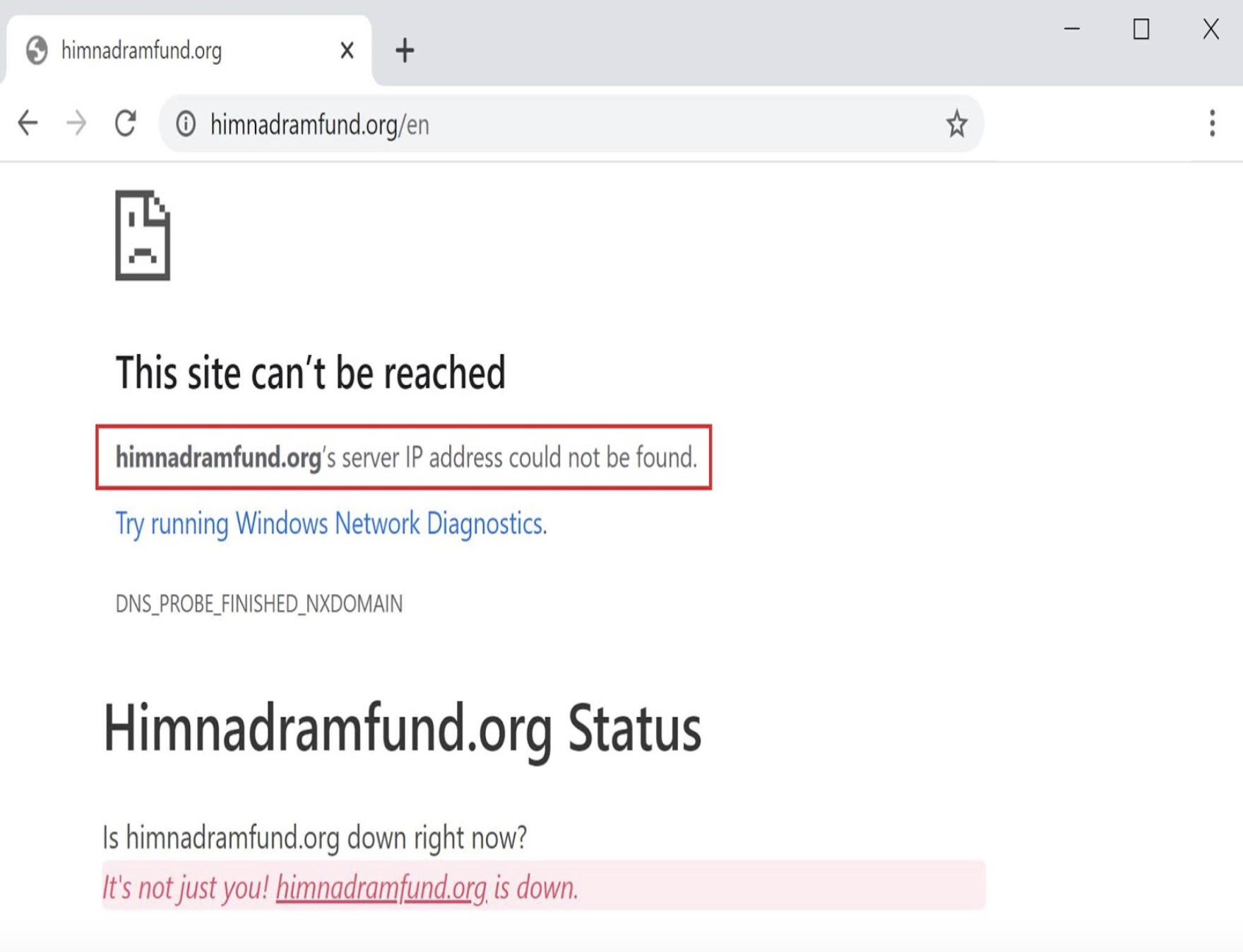 |
Earlier, another fake website similar to himnadram.org was shared, where the letters n and m were switched on the URL. The appearance of this website (its interface) was an exact replica of the real website of the Foundation. It was obvious that it was specifically created to embezzle the transferred funds. After active appeals from citizens, Armen Mkrtchyan, who was vocal about the domain registered under NameSilo.com, put out an email saying that the website was blocked.
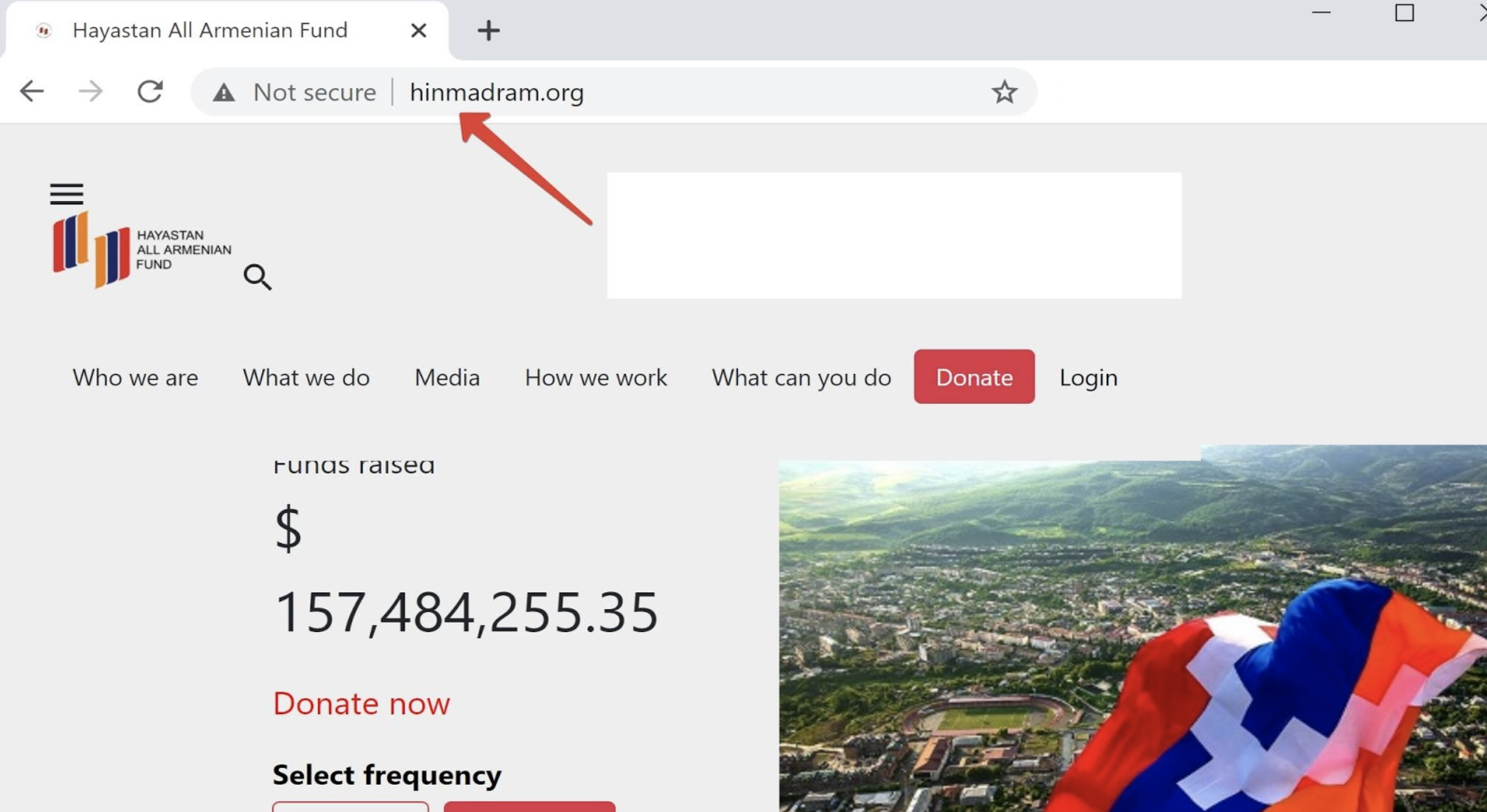
There were also examples of fundraisers that could immediately be identified as fake, owing to the website and content containing grammatical and spelling errors. This was the case with the page zinvorner (soldiers) on donationalerts.com. During the war, a call was posted on the Facebook page «Ամեն ինչ մի օր լուռ կվերջանա» (“Everything will end in silence one day”), which explained step-by-step how to donate money “for a good cause”.
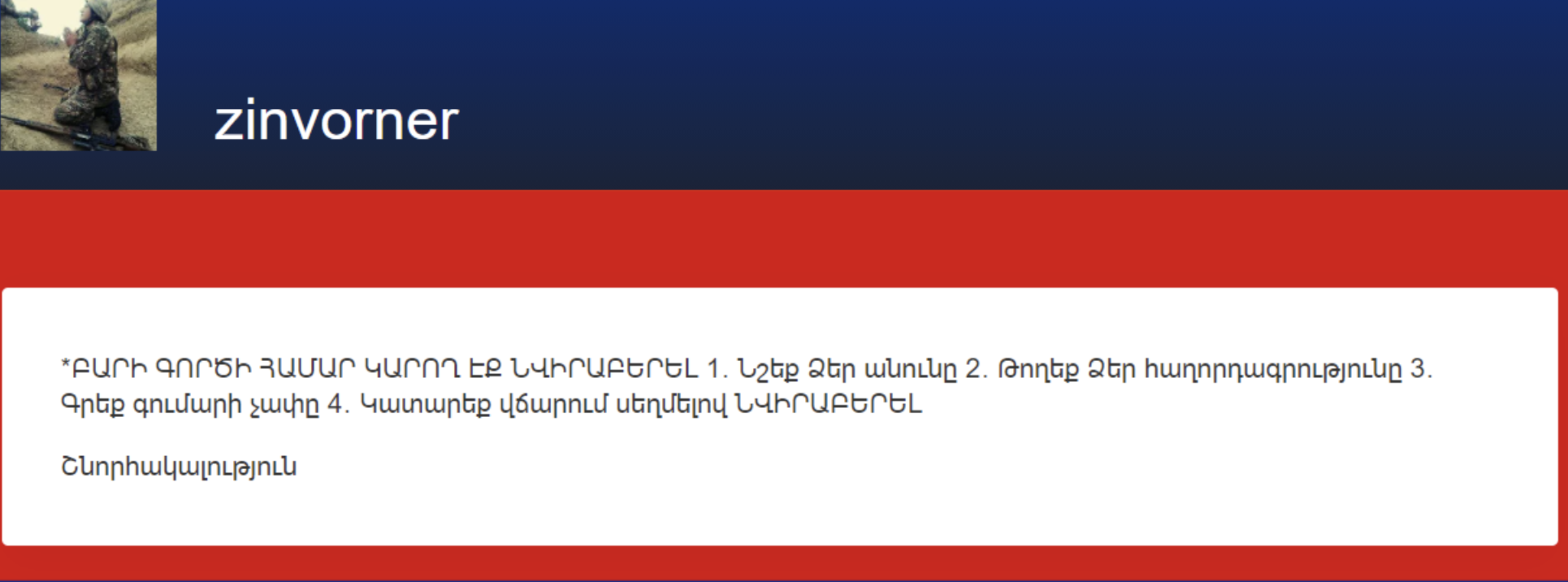
There is no report published on the website regarding how money donated in the past was used or how money currently donated will be spent. There is no mention of contact details or names of the organizers on the website. Rather, through the who.is online tool, we see that the website was registered in 2015, and we learn from alexa.com that it has high visibility in Russia and the USA.
The police announced that only preliminary investigations were carried out on the websites Hinmadram.org, Himnadramfund.org, and Donationsalerts.com regarding the current fundraisers and that, during this time, it was not possible to get information on those registering domain names or people who donated money to the fundraisers.
At the same time, the police noted that authority over .org and .com domains are not within the jurisdiction of RA law enforcement bodies. In accordance with international frameworks, information on these sites can only be obtained when a criminal case based on fraudulence and abuse of trust has been opened by individuals or legal entities who have submitted applications or reported crimes about money stolen from them.
The same bank accounts on Armenian and Azerbaijani telegram channels
Fundraising was carried out on the Новости Армении (Armenian News) telegram channel to provide assistance to the victims of the Second Artsakh War. The page encouraged financial assistance to be sent to the card account 4890 4947 0987 4051. The Azerbaijani Азербайджан | Новости (Azerbaijan | News) also called for money transfers to the same card account using Telegram, allegedly to support Azerbaijani citizens who suffered as a result of the war.
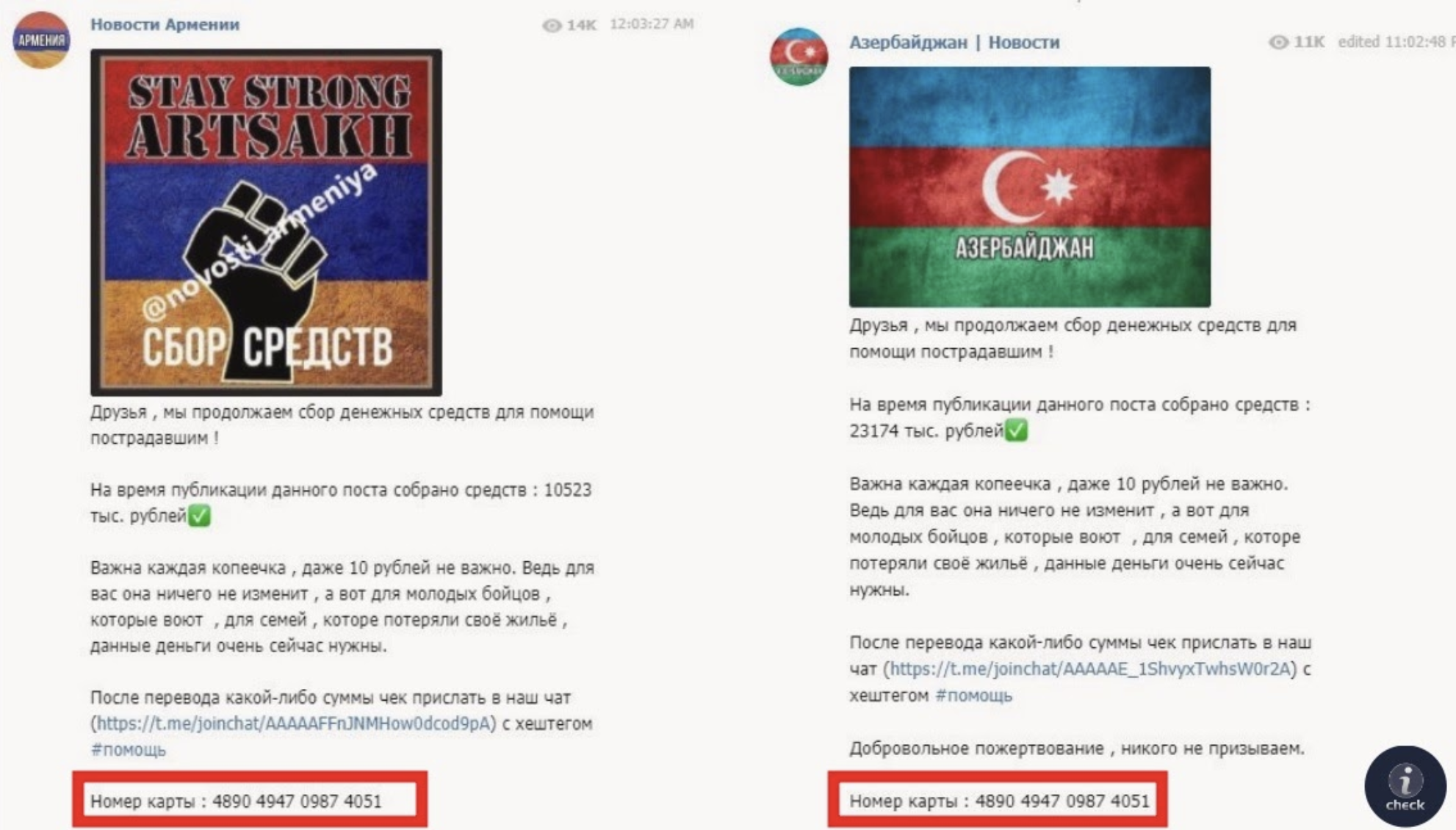
Photograph taken from infocheck.am
According to the police, an investigation conducted showed that that the Новости Армения (Armenian News) and Азербайджан Новости (Azerbaijan | News) Telegram channels were controlled from the territory of the Republic of Azerbaijan. Information about bank accounts used by these Telegram channels could only be obtained in the event that a criminal case was initiated, since the bank account was not issued by or registered with an Armenian bank and included protection of personal data as well as banking secrecy. No criminal case has been initiated in this regard.
Fundraisers on behalf of soldiers’ parents
Fundraisers were also organized on the well-known crowdfunding platform gofundme.com to provide assistance to the family of deceased soldier Albert Hovhannisyan, first on October 8th and again on the 11th.
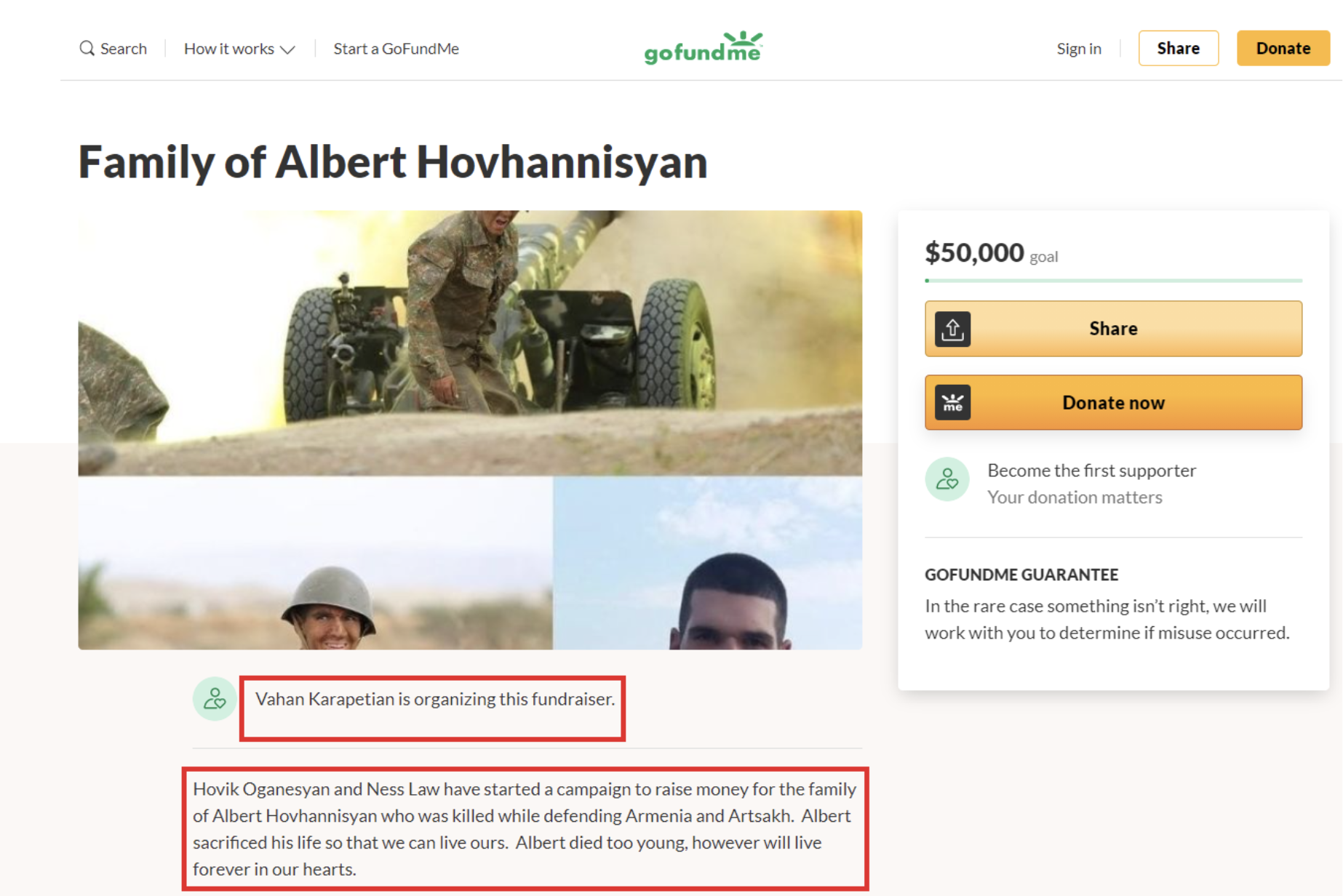
The image of artilleryman Albert was not chosen randomly; he became famous when the Ministry of Defense shared a photo of him during a military operation.
It should be noted that Albert Hovhannisyan's father, Artak Hovhannisyan, had repeatedly called for support to be transferred not to his family but to the Hayastan All Armenian Fund and, on October 27th, he donated his personal car to the Armenian army.
Artak Hovhannisyan told us the fundraiser was organized without his consent.
"When I was told about it, I was extremely angry. I told them to find out who the organizers were. Later we found out who it was. They said that they did it with good intentions. Now everything is in order," said the father of the deceased soldier.
According to Artak Hovhannisyan, the money collected from the fundraiser was later transferred to him.
The National Security Service informed us that no materials have been prepared and no criminal cases initiated to determine the legitimacy of the two above-mentioned fundraisers. The police have also not conducted any investigations on this case.
Fundraisers for soldiers’ medical treatment
One or two weeks into the war, fundraisers began being organized to cover medical expenses of wounded soldiers. Facebook user Marianna Samsonyan, for example, began an initiative to raise $70,000 on Facebook. The goal was to raise funds for Arsen Avetisyan, a soldier who lost his eye during the battles, in order for him to have an operation in Germany.
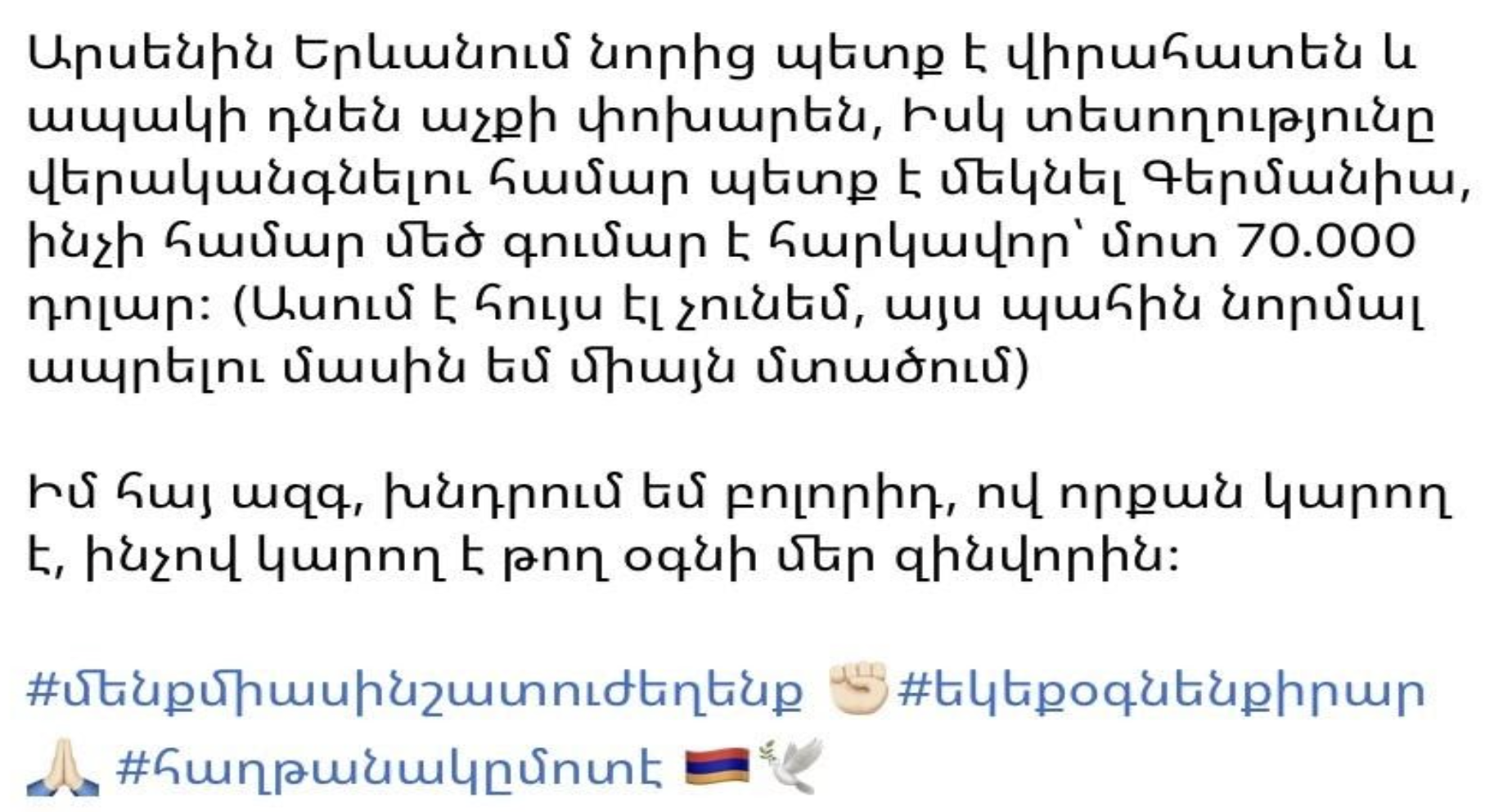
In an interview with Hetq, the Ministry of Defense’s Head of the Department for Health, Social Protection, and Veterans Aleksandr Avetisyan said that he is aware of fundraising on social media and is concerned about it, since the healthcare system as a whole provides medical care to wounded soldiers, volunteers, and reservists.
The $70,000 fundraiser was carried out despite the fact that the Astghik Medical Center, where the soldier was receiving treatment, did not provide any documents necessitating continued treatment in Germany. Both the director of the medical center and Arsen’s physician confirmed this.
Arsen Avetisyan, who lost his left eye, told us that the fundraiser was organized when there was hope of receiving treatment abroad. He changed his mind after speaking with the physician, who said that even surgery in Germany would not restore his vision. Arsen noted that, after the announcement was spread, he spoke with a representative of the military police, who assured him that all expenses related to his treatment would be covered by the state and that there was no need for fundraising.
After learning this, Arsen asked the organizer of the fundraiser to delete the post. According to him, no money was transferred to his account during that time. Arsen had trouble answering the question of who decided and on what basis it was decided that eye reconstruction in Germany would cost $70,000.
According to Arsen’s physician, Asya Adyan of Astghik Medical Center, a foreign body was removed from the soldier’s eye. He underwent surgery one time on October 27th, immediately following the hostilities, and another in November. The state covered all the expenses.
“Arsen himself asked if there was a chance to restore his vision. We explained that there is no such method to restore a missing organ. I said that he could look into it, but if there is no organ, then it can’t be restored,” said Asya Adyan.
As for the $70,000 treatment in Germany, the doctor said that she was not aware of the money and how that figure was decided.
Ongoing fundraiser
On December 14, 2020, a new announcement about a fundraiser was posted on Armenian Facebook. The goal was to provide assistance to Erik Gasparyan, who was wounded during the war.
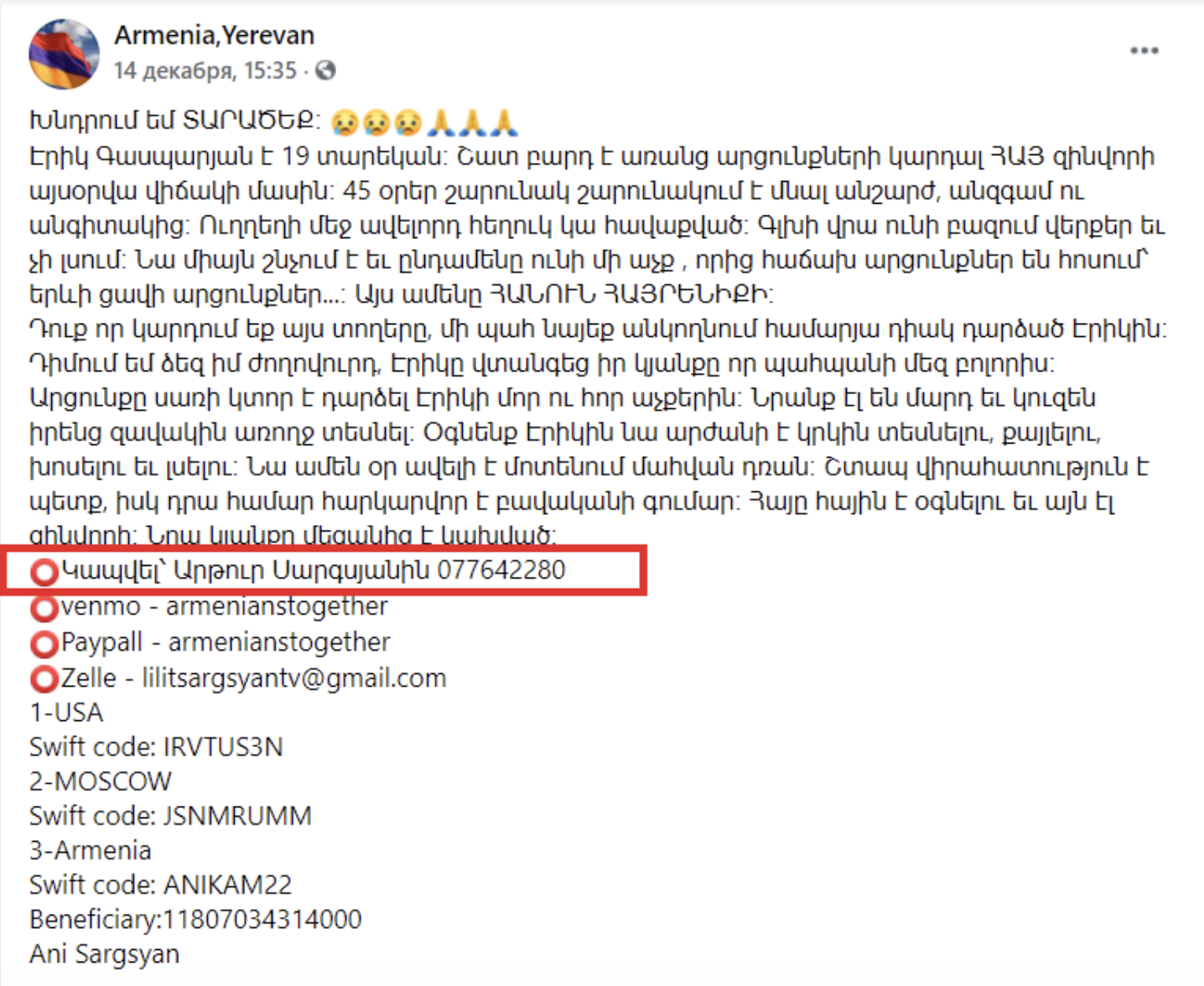
The information was also spread using a fake news website called haygood.ru, where clickbait headlines and news containing misinformation are consistently published.
We contacted Artur Sargsyan, the contact person mentioned in the post. He noted that he participated in organizing the fundraiser but that it already ended days ago and the money was transferred to the soldier’s family. The fundraising announcement put out on December 14th had nothing to do with their initiative.
Erik Gasparyan’s brother Gor Gasparyan also didn’t consent to the fundraiser. In a conversation with us, he said that the fundraiser was in fact organized by a user named Lilit Sargsyan. He was thankful for the fundraised money, which was transferred to the family but, at the time, the calls were out of place and put out by people unknown to him personally. According to Gor, he used his brother’s page to repeatedly ask for the posts about the fundraiser that were false and spread without his knowledge to be removed.
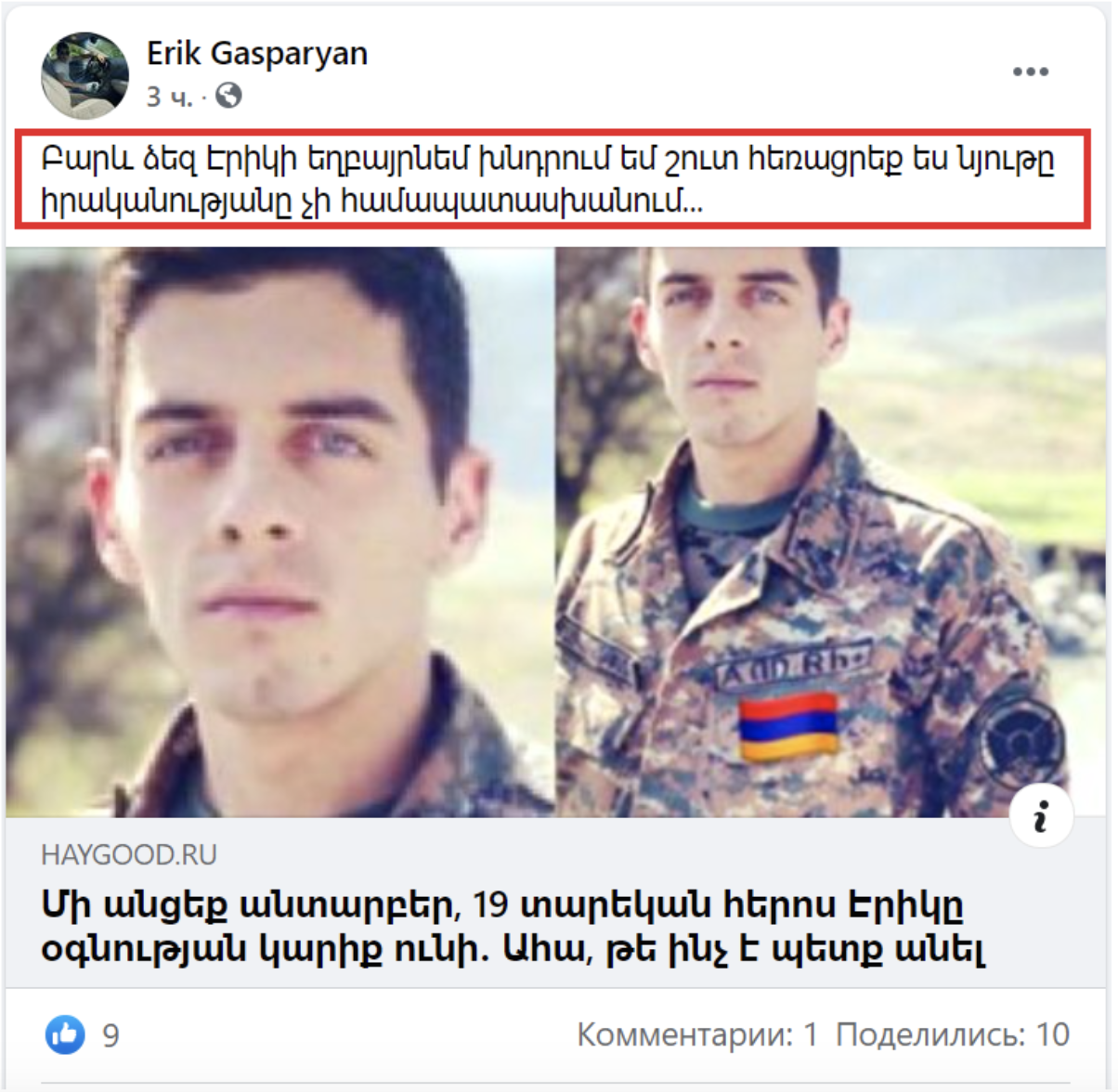 |
 |
According to Gor, his brother already underwent an operation and expenses were fully covered by the state.
Hetq wrote to the police, asking if materials had been prepared to determine the legitimacy of the online fundraisers. The police reported that:
- A criminal case was initiated by a citizen in the Arabkir district concerning a fundraiser with characteristics of large-scale fraud that was organized through the social media website Facebook.
- Materials were prepared at the Artashat department of the Ararat regional district in connection with a fundraiser carried out by a citizen via the social media website Facebook, which was left unpunished on the grounds of there being an absence of criminal elements.
- Under the pretext of supporting two soldiers, different users requested and received 20,000 drams and 5,000 rubles using deception and the abuse of trust, thereby stealing funds. On December 7th, a criminal case was initiated in connection with the incident, describing elements of significant theft of another person’s property through the use of computer technology.
Another case of fundraising is being investigated by Armenia's Investigative Committee. A criminal case was initiated after $3,100 was collected via a fundraiser organized on the social media network Facebook named “Urgent support for Artsakh” that was not transferred to the Hayastan All Armenian Fund. The criminal case was initiated on the grounds of especially large-scale fraud. A preliminary investigation of the case is underway.
Humanitarian aid or personal goods?
On December 5th, there was an announcement on social media and news sites that 2.5 tons of humanitarian aid sent to Armenia from Germany was left in the basements of the Governor of Lori Andrey Ghukasyan and his relatives for 3 weeks. According to the post, the humanitarian aid intended for soldiers and the people of Artsakh was embezzled and the Diaspora should no longer send donations.
Hours after the post, the former Governor of Lori, Andrey Ghukasyan, responded to the accusations. According to him, Artur Kharatyan, who imported the humanitarian cargo, abandoned the cargo to the state, and the cargo was accepted by the Lori Regional Administration.
“The cargo examination revealed that most of the cargo was not humanitarian, since there were items like filters, expensive tableware, watches, cosmetics, and psychotropic medications that cannot be considered humanitarian aid. Nevertheless, the cargo will be fully distributed to the needy, and the rest will be taken care of by the police, after legal assessments are made regarding the nature of the cargo and psychotropic medication,” stated the governor.
We got in touch with Ani Marko, a representative of the Armenian community in Germany, who initiated the collection of aid. She was in Armenia to deal with the issue surrounding the 2.5 tons of aid that had ended up in the Governor’s basement.
“I am from the Armenian community in Germany and did the collection myself. Along with the aid, people gave one or two extra boxes, asking that these be passed along to relatives. There may be medicine, shoes, or other gifts there,” she explained.
According to Ani, Andrey Ghukasyan suggested that the 40 boxes that were not intended as aid but rather for relatives be transferred to the regional office. The Governor promised to return it and distribute the remaining cargo among individuals affected by the war and the army.
The former Governor of Lori, Andrey Ghukasyan, told us that 70% of the cargo was not humanitarian aid. Only 30% of the goods were intended for the people of Artsakh. According to the Governor, the aid was originally not distributed due to this issue.
Ani Marko confirmed that there were two filters and two televisions along with the aid that belonged to Artur Kharatyan. However, at roughly 200 kilograms, the personal cargo only made up around 10% of the aid sent.
We were informed by the RA Police that materials are being prepared for this case.
The police were notified about items of military significance selling on the website list.am that were sent from the Diaspora for use in the Armed Forces. These were sent to the Defense Ministry’s military police for further investigation.
In turn, the Investigative Committee responded to our inquiry, stating that a criminal case involving an Armed Forces official was initiated on the basis of fraud. More specifically, among the aid provided to military personnel, the N military unit deputy commander of the rear did not register or provide staff with 10 shovels, 3 pickaxes, 2 lings, 6 rubber combat boots, 40 packs of cigarettes, and one sleeping bag. The criminal case was initiated on the grounds of abuse of power with features of exceeding official powers or official inaction during martial law in wartime or combat. It calls for imprisonment for a period of 7-13 years, with or without the confiscation of property.
How was the humanitarian aid donated to the government used?
Food and clothing donated to the government as aid was allocated to the Ministry of Emergency Situations to store and distribute. The assistance includes what was collected in Armenia as well as what was sent to Armenia from abroad.
According to Deputy Minister of Emergency Situations Armen Pambukhchyan, the Ministry accepted the assistance using the handover-takeover process and similarly signed it off from the warehouse. The Ministry of Emergency Situations does not have any information about humanitarian aid provided to beneficiaries being put up for sale.
The cargo allocated to the Ministry was not opened. The contents of the aid were listed on the box. The Ministry of Emergency Situations was not involved in documenting the needs of the beneficiaries but rather notified the regional and community districts about already existing demands.
The main problem Armen Pambukchyan singles out is when people send goods for specified communities or groups. They abandon that cargo so that it’s not cleared through customs but ask that the Ministry of Emergency Situations hand it over to them to take and distribute. In many cases, the community and the person bringing the aid share what was meant to be distributed in Armenia.
We also asked Deputy Minister of Emergency Situations Armen Pambukchyan about the photos circulating on the internet, in which humanitarian aid packages also included items intended for relatives of the senders that were not aid. He emphasized that they received a closed box that they left unopened, and that the citizens opened the closed box when they received it and saw various products that included not just food but also medicine, other supplies, and even binoculars.
To summarize the investigation of organized fundraisers and collected aid during the war, we should note that, as of March 2nd of this year, the police have investigated 15 cases. Seven criminal cases were initiated, and one case was dismissed due to an absence of criminal activity. The Investigative Committee initiated 3 criminal cases, of which one was dismissed due to the absence of criminal activity and 2 are under preliminary investigation.
Authors: Hranush Dermoyan, Ofelia Simonyan
Coordinated by Diana Ghazaryan
Main photo taken from the RA Government
 Videos
Videos Photos
Photos
Write a comment